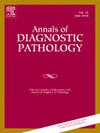Prognostic and clinicopathological significance of the new grading system for invasive pulmonary adenocarcinoma: A systematic review and meta-analysis
IF 1.4
4区 医学
Q3 PATHOLOGY
引用次数: 0
Abstract
In 2020, the International Association for the Study of Lung Cancer (IASLC) introduced a new grading system for invasive pulmonary adenocarcinoma (IPA). This meta-analysis aimed to validate the prognostic utility of this grading system and identify relevant clinicopathological features. The PubMed, Embase, Web of Science, and Cochrane Library databases were searched for relevant studies published between January 1, 2020 and March 5, 2024. Hazard ratios (HRs) with corresponding 95 % confidence intervals (CIs) were pooled to evaluate the effect of IASLC grading on prognosis. Odds ratios with corresponding 95 % CIs were pooled to assess relevant clinicopathological features. Twenty-two studies comprising 12,515 patients with IPA were included. Regarding overall survival, grade 3 adenocarcinomas had a worse prognosis compared with grades 1–2 (HR: 2.26, 95 % CI: 1.79–2.85, P<0.001), grade 1 (HR: 4.75, 95 % CI: 2.61–8.66, P<0.001), or grade 2 (HR: 1.71, 95 % CI: 1.28–2.29, P<0.001). Considering recurrence-free survival, grade 3 tumors had a higher recurrence risk than grades 1–2 (HR: 1.92, 95 % CI: 1.53–2.41, P<0.001), grade 1 (HR: 4.43, 95 % CI: 2.91–6.73, P<0.001), or grade 2 (HR: 1.67, 95 % CI: 1.33–2.10, P<0.001). In the subgroup analysis of stage I patients, grade 3 tumors exhibited a similarly poor prognosis. In addition, grade 3 adenocarcinomas were associated with aggressive clinicopathological features. This study demonstrated that the IASLC grading system is a robust predictor of prognostic stratification in patients with IPA, and warrants further promotion and worldwide implementation.
新的浸润性肺腺癌分级系统的预后和临床病理意义:系统回顾和荟萃分析
2020年,国际肺癌研究协会(IASLC)引入了一种新的浸润性肺腺癌(IPA)分级系统。本荟萃分析旨在验证该分级系统的预后效用,并确定相关的临床病理特征。检索了PubMed、Embase、Web of Science和Cochrane Library数据库,检索了2020年1月1日至2024年3月5日期间发表的相关研究。合并风险比(hr)和相应的95%置信区间(ci)来评估IASLC分级对预后的影响。比值比与相应的95% ci进行汇总,以评估相关的临床病理特征。纳入了22项研究,包括12515例IPA患者。关于总生存率,3级腺癌的预后比1 - 2级(HR: 2.26, 95% CI: 1.79-2.85, P<0.001)、1级(HR: 4.75, 95% CI: 2.61-8.66, P<0.001)或2级(HR: 1.71, 95% CI: 1.28-2.29, P<0.001)更差。考虑到无复发生存期,3级肿瘤的复发风险高于1 - 2级(HR: 1.92, 95% CI: 1.53-2.41, P<0.001)、1级(HR: 4.43, 95% CI: 2.91-6.73, P<0.001)或2级(HR: 1.67, 95% CI: 1.33-2.10, P<0.001)。在I期患者的亚组分析中,3级肿瘤表现出类似的不良预后。此外,3级腺癌与侵袭性临床病理特征相关。本研究表明IASLC分级系统是IPA患者预后分层的可靠预测指标,值得进一步推广和在全球范围内实施。
本文章由计算机程序翻译,如有差异,请以英文原文为准。
求助全文
约1分钟内获得全文
求助全文
来源期刊
CiteScore
3.90
自引率
5.00%
发文量
149
审稿时长
26 days
期刊介绍:
A peer-reviewed journal devoted to the publication of articles dealing with traditional morphologic studies using standard diagnostic techniques and stressing clinicopathological correlations and scientific observation of relevance to the daily practice of pathology. Special features include pathologic-radiologic correlations and pathologic-cytologic correlations.

 求助内容:
求助内容: 应助结果提醒方式:
应助结果提醒方式:


